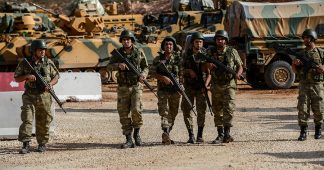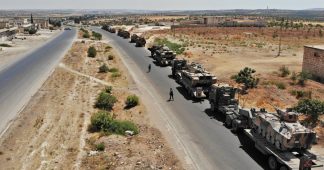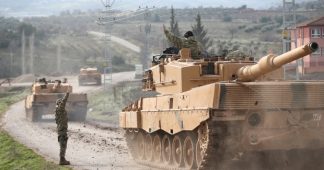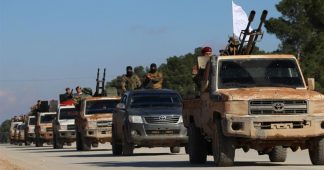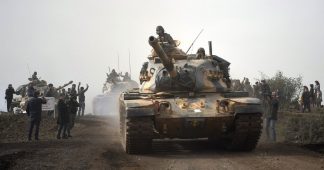By Sarah Abed
September 10, 2019
On Sunday, six military vehicles from Akcakale district in southeast Sanliurfa in Turkey, crossed the border into Syria and joined a US military convoy in carrying out joint military ground patrols from Tel Abyad, Al Raqqa governorate to Ras Al Ain, Al Hassaka governorate. Two helicopters flew overhead, and unmanned aerial vehicles were also used according to Turkey’s Defense Ministry.
The Kurdish People’s Protection Units (YPG) are leaving areas on Turkey’s border and uprooting fortifications as part of the US-Turkey “safe zone” agreement, which was the result of relentless pressure from Turkish President Recep Tayyip Erdogan, who had threatened to unilaterally proceed with his plans if the US dragged its feet. Turkey also threatened to carry out a military operation last month, against Kurdish militias east of the Euphrates, but US officials stopped the operation.
Under the “safe zone” initiative Erdogan wants to establish a “peace corridor” through which he can send back a million of the four to five million Syrian refugees currently in Turkey. Refugees would be forced to resettle in northern Syria on Turkey’s borders to create a buffer zone whereby changing the demographics of the area. It’s worth noting that many of these displaced refugees are not from the northern Syria.
Erdogan has threatened to “open the gates” and allow millions of refugees currently residing in Turkey to flood Europe and specifically Greece, if his requests are not met in Syria. Some have noted that these refugees are not even Syrian and came from dozens of other countries to fight alongside foreign-funded extremist groups in Syria.
Ankara has also been looking into Russian military equipment and threatened to build nuclear weapons.
In a statement made to the Syrian national news agency SANA an official source at the Foreign and Expatriates Ministry stated, “The Syrian Arab Republic condemns in the strongest terms launching joint patrols by the US administration and the Turkish regime in the Syrian al-Jazeera region in a flagrant violation of international law and the sovereignty and territorial integrity of the Syrian Arab Republic.”
Syria sees this as a form of aggression which is aimed at complicating and prolonging the crisis in Syria and to hinder significant progress made by the Syrian Arab Army against the remaining terrorist groups. Syria absolutely rejects the creation of a “safe zone” and affirms its determination to counter any attempts that put its safety and territorial integrity at risk.
The Syrian government has highlighted previously that Erdogan’s true intentions include “expansionist ambitions” and reviving the Ottoman empire, under the façade of protecting his borders from Kurdish terrorist groups.
In January 2018, Erdogan carried out Operation Olive Branch by invading Afrin and effortlessly defeating the YPG. In a matter of months more than 150,000 Kurds were displaced when they fled to neighboring areas and were replaced with refugees that had fled to Turkey. The demographics were changed and many of the residents who did stay complained about living under harsh extremist conditions enforced by the Turkish-aligned resettled refugees.
At that time, the Kurdish population in Afrin realized that the US will not defend them against an onslaught by NATO ally Turkey and had left them to fend for themselves. The mistake that separatist Kurds have made for the past four years during this war is relying on the United States to save and protect them. Thinking that Washington cares about their independence or political ambitions has put them in several embarrassing situations, including the one they are in now, east of the Euphrates river.
Ultimately, separatist Kurds are responsible for the illegal presence of foreign armed forces from the United States, France, Britain, and coming in at the eleventh hour, Denmark in northern Syria. Had they not turned against the Syrian government and sold their dignity for weaponry, training, and funds from the US led coalition, Turkey would not have had an excuse to invade. This does not take away from the blame that should be placed on all other parties that are impeding the Syrian militaries progress.
Before the war, Kurdish minorities lived peacefully alongside their fellow Syrian brothers and sisters and many were enlisted in the Syrian army fighting against terrorists. It was only when the United States started backing and providing them with funds, supplies, training, etc. did they turn to treason and treachery. This sort of behavior is not uncommon, Kurds with separatist ambitions have previously been used to create division and instability in the region, including during the Iraq/Iran war. They are closely allied with Israel and have worked with several terrorist groups during the eight-year war in Syria.
The SDF/YPG are seen by Turkey as the Syrian offshoot of the Kurdistan Workers Party (PKK) with whom they have been in conflict for over three decades.
The hostile environment created by the self-declared autonomous Kurdish administration has been rejected by not only the Syrian government and the non-Kurdish Syrian majority in Al Hassaka governorate but by Russia, Iran, and Turkey who’ve issued joint statements declaring their opposition to the autonomous regions set by the Kurdish-led SDF and the Kurdish People’s Protection Units in northern Syria saying they “reject…all attempts to create new realities on the ground under the pretext of combating terrorism.” On Sunday, Syrians held a massive rally in Deir Ezzor against the US-backed Kurdish militias calling for their expulsion from the area.
Last December, when U.S. President Donald Trump announced the withdrawal of US troops from Syria, separatist Kurds turned to Damascus for talks, but when Washington didn’t follow through with the withdrawal, the talks turned stale. There has been mention that talks are now resuming but as long as the Kurdish militias and their political mouthpieces continue receiving handouts from Western nations and direction from the US/Israel, negotiations will be futile.
* Sarah Abed is an independent journalist and political commentator. She is a frequent contributor to Global Research. For media inquiries please email sarah@sarahabed.com.
